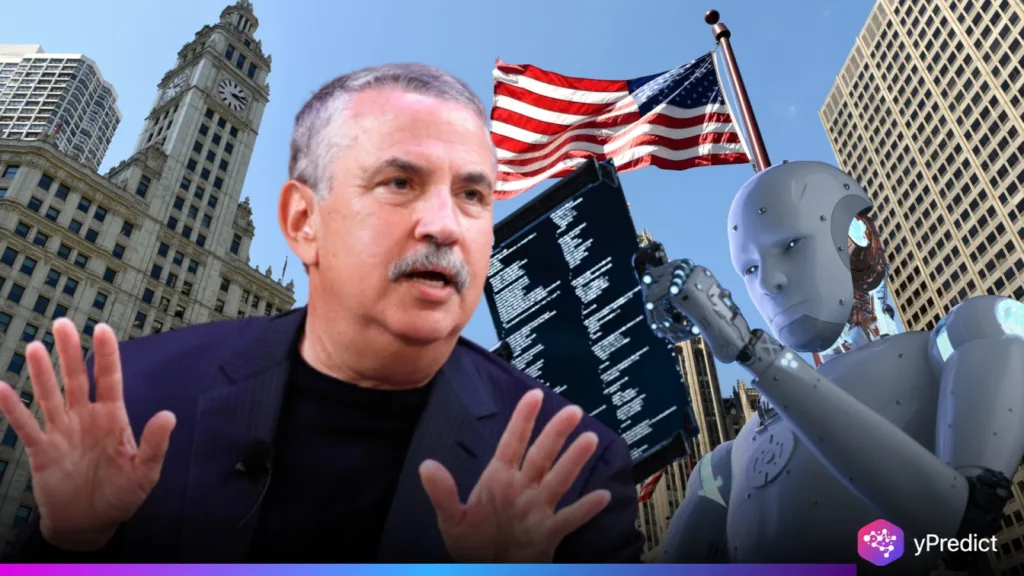
Thomas Friedman just sounded the alarm on national TV. He thought in part that climate change and AI are now existential threats. Both, he noted, are increasing faster than analysts anticipated. And both rush into partisan fracture stateside. New research backs his climate claims — showing warming accelerating by up to 50 percent. On AI, his warning of impending ‘superintelligence’ diverges from expert predictions, but Friedman’s point isn’t just technical. He instead focuses on the threat to social cohesion. His case is simple—without political unity, America is unprepared for the impending tempests, both physical and virtual.
Climate Change, National Security Crisis
Thomas Friedman called climate change an instability force. His ‘super-extreme weather´ brings attention to how natural disasters create refugee flows and resource conflicts. As early as 2015, the U.S. National Security Strategy had identified these threats. Now, new science reinforces the argument. Found 0.27 / decade warming in a 2025 study. That’s almost twice as fast as earlier projections.
Call to Action from IPCC: It has emissions peaking before 2025 and declining by 25% by 2030. Without that, the 2ºC tipping point will fall out of reach.
Friedman connects these numbers to security. Floods and fires, and drought, are not local. They ignite wars and migrations and drafts. He observes, for instance, that US politics is still very much a mess. Others still simply deny climate risks. It dilutes the country’s preparedness.
Its caution calls to mind a straightforward fable. If your roof leaks, turning your back to the rainstorm isn’t going to keep the water out. The storm only gets worse. To Friedman, climate denial is indeed such malpractice. Price comes in below, not chatter. His framing links melting glaciers with boots on the ground. Climate is no longer an arcane science–it’s ammunition.
Artificial Intelligence and Rapid Risk
Thomas Friedman targeted AI, too. His timetable is close: chaos in a year or two. That’s way shorter than most professional estimates. Many of the other AI leaders predict general intelligence closer to 2040 or later. But Friedman emphasizes immediate disruption.
He sees AI already upending work, elections, and even war. Bots spam sites with scraped content, LLMs that throw up deepfake videos to confuse voters, and even defense systems can fall victim to AI cyberattacks. For Friedman, these issues don’t take a break for AGI. They exist now.
His obsession with ‘superintelligence’ is an expression of a more general concern. So, if and when machines learn faster than us, they can tip the power balance. Governments can lose control — especially if the public is institutionally untrusting.
The U.S. context matters here. As Friedman put it, partisanship gets in the way of reasonable politics. Climate denial meets AI denial. Still others dismiss AI risks as science fiction. But Friedman warns that leaving the topic alone is letting the dangers stew.
A nice metaphor encapsulates his point. To disregard AI is to dismiss a smouldering kitchen fire. You don’t wait for the house to be on fire before you go get the water. That urgency defines his message.
Conclusion
Here’s how Friedman’s warnings collapse climate and AI under one frame: security. Both move faster than expected. They both fall heavily in a broken nation. His climate case is data-powered — warming is speeding up, emissions have to come down quickly. His AI concerns are scattershot: bots, deepfakes, and brittle systems. They arrive in shifts, but the threat is ever-present. Political paralysis makes response harder. That’s his deepest worry. Security, it’s not guns anymore. It’s about atmospherics and code. And if we’re not united, Friedman says the U.S. is at risk of being left behind by both storms—and machines.






